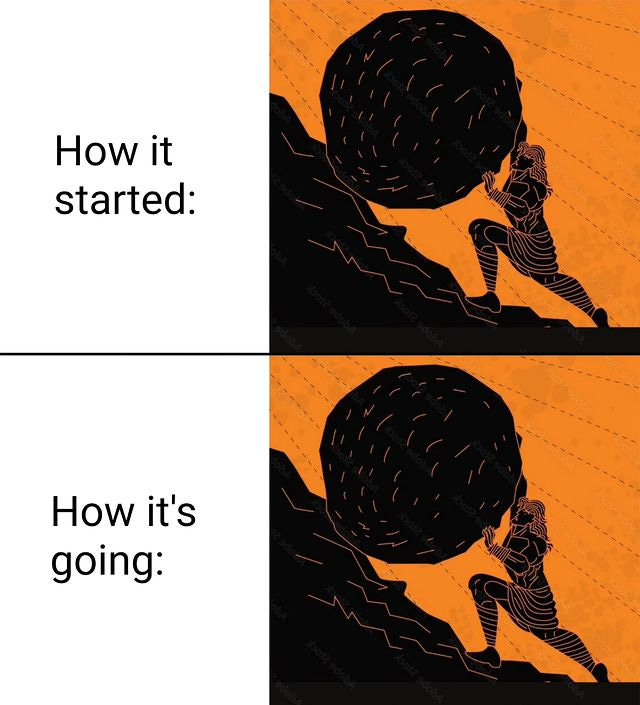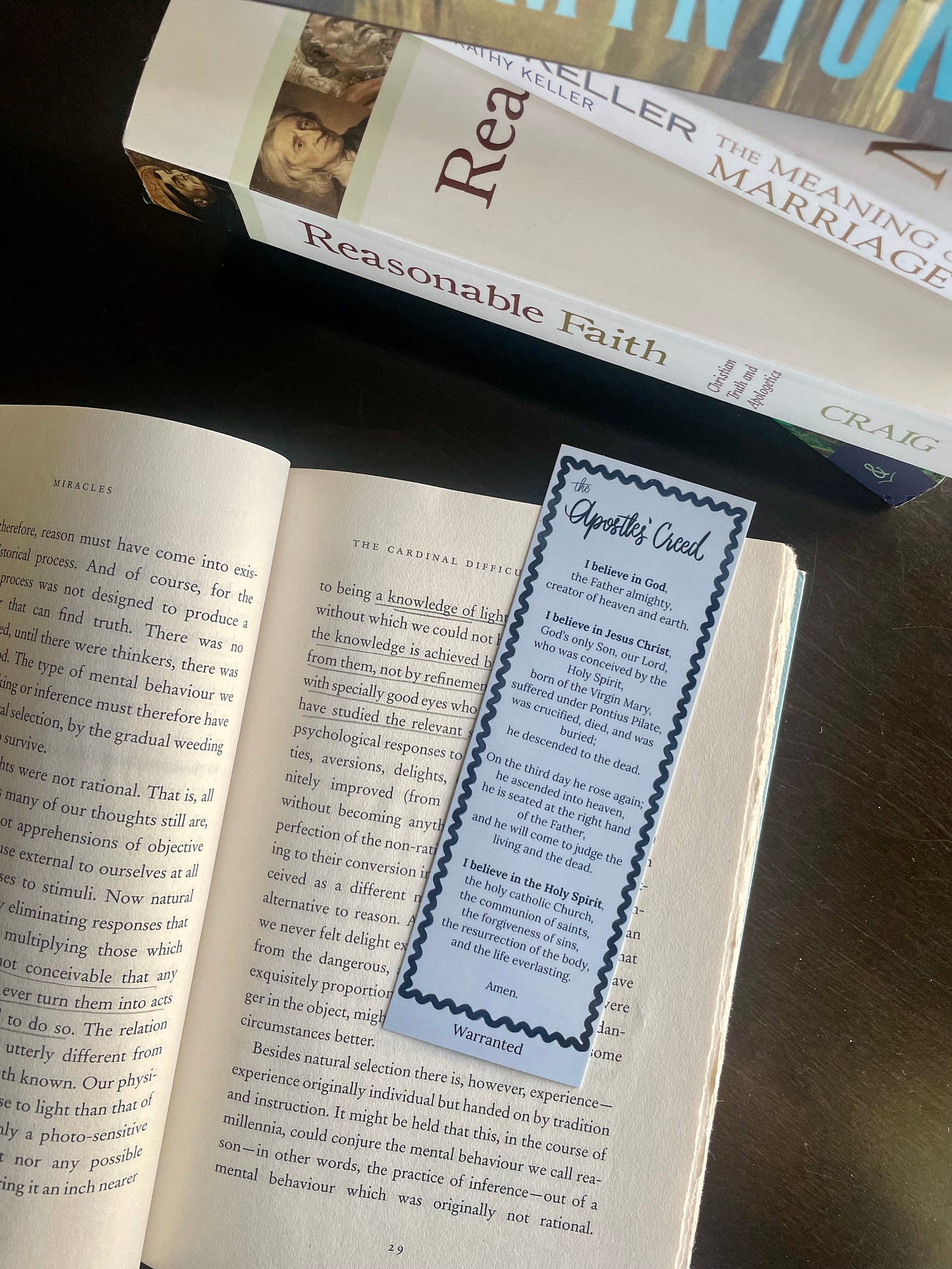The Myth of Sisyphus has been surprisingly popular on Instagram lately.
You probably know the story, or at least you’ve seen the memes. If not, here’s the E.S. Phillips Extremely Abridged Version: Sisyphus, an ancient king, angers the Greek god Zeus. As a final act of punishment, Zeus condemns Sisyphus to spend eternity rolling a massive rock up a hill in the abyss of Tartarus.
The boulder is enchanted such that Sisyphus can never reach the top or finish his task—instead, he must engage in the same pointless activity, day after day, as punishment for his crimes against Zeus.
The philosopher Albert Camus famously retold the Myth of Sisyphus in his 1942 essay by the same name. Camus’ essay explores the story through the lens of Absurdism—the philosophical view that, without any kind of external intelligence or justification for existence, life is meaningless.
If it sounds like a pretty bleak worldview, that’s because it is. In Camus’ view, the only way out of the meaninglessness is through; that is, the only way to overcome the meaninglessness of life is to wholly embrace it. Once you recognize that there’s nothing to work toward, that at the end of the day you’re just walking down the hill to turn around and walk back up again, then you’re really “free.”
And that’s how he concludes his retelling of the Myth: “The struggle itself to the heights is enough to fill a man's heart. One must imagine Sisyphus happy.”
By and large, this outlook on life and work seems to have a strong foothold in the minds of modern people, especially young people.
I’ve even found myself getting caught up in it, at times. I’m sure you can understand the temptation; life and work can be tiring and full of repetition. Laundry is washed so that it can be dirtied again. Meals are prepared so that they can be consumed. Emails are sent so that tasks can be completed and make room for new tasks.
But, as tempting as it can be to fall into the Sisyphean trap, I don’t think that this mindset can find a home in the Christian worldview.
The dignity of work
It may sound like I’m being a bit harsh toward the absurdist point of view, but I actually do sympathize with the line of reasoning that would lead a person to that conclusion. If there is no Creator endowing us and our actions with meaning, then what is life but our futile, repetitive attempts to find some kind of entertainment, comfort, or distraction while we can?
I also think that a poor understanding of God can lead well-meaning Christians to fall into the same traps.
If there is some kind of ultimate afterlife, then why make us suffer through life on earth at all? What’s the meaning of the things we go through now—the jobs we work, the relationships we have, the major and minor inconveniences—if it’s all going to be wiped clean anyway?
There’s an obvious mistaken assumption here; while, yes, I do believe we have a greater hope to look forward to that transcends the world we live in now, I don’t think that implies that God is only interested in our present so far as it directly impacts that ultimate future.
I think the timelines are more nebulous than that. C.S. Lewis, in The Great Divorce, puts it this way:
“Not only this valley but all their earthly past will have been Heaven to those who are saved. Not only the twilight in that town, but all their life on Earth too, will then be seen by the damned to have been Hell. That is what mortals misunderstand. They say of some temporal suffering, ‘No future bliss can make up for it,’ not knowing that Heaven, once attained, will work backwards and turn even that agony into a glory…Both processes begin even before death.”
Still, I wrestle with these questions often. And while I can’t answer them completely, what answers I do feel confident in can be found on the first few pages of the Bible.
In Genesis 2, we read a second, more detailed account of the creation story with a magnifying glass on God’s creation of the first man, Adam. God forms the man out of dust and places him in Eden, the garden of paradise.
Adam isn’t just a plaything for God to manipulate as he pleases, though; he’s created in the image of God with a specific purpose, revealed in verse 15.
“The Lord God took the man and put him in the garden of Eden to work and keep it.”
Genesis 2:15
Sometimes, I think it’s easy to read the condemnation pronounced on Adam after the fall (“cursed is the ground because of you; in pain you shall eat of it all the days of your life…”) and assume that the fall was the direct cause of all work everywhere.
Work doesn’t go away if there’s no fall, though. Sure, the work Adam was doing in Eden before eating from the tree was apparently different from the toil he (and all of humanity after him) experienced afterwards.
Productivity, creation, management: these all seem to be part of our identity as God’s image bearers on earth. But what does that mean? How do we redeem work?
What is “work?”
There’s no real right answer to this question, because I think that gainful employment can include a wide range of possibilities. Office jobs, trades, creative professions, homemaking, side hustling, shift work, caretaking, ministry…the list could go on forever.
That’s because, in this worldview, “work” isn’t just how you get a paycheck—it’s how you employ yourself, how you spend your time. You can do good work whether or not it’s in service to a boss or a client or a deadline.
Genesis 2 affirms that you’re called to it and designed for it. I can draw on my own experience, too: Sure, vegging on the couch is nice occasionally, but I’m more content and fulfilled when I’m working toward something positive, whether that’s completing a task at my job, pouring myself into a creative pursuit, or making my home a clean and welcoming space.
How do I know if I’m doing a good job?
You’re probably already thinking of that well-known verse, Colossians 3:23:
“Whatever you do, work heartily, as for the Lord and not for men…”
But what does it mean to “work for the Lord?”
I’ve wrestled with this question since I was a student. I’m not an educator or a medical professional. I don’t do law or politics. The decisions I make throughout the course of a workday don’t necessarily save lives or change the world (in the way you’d normally conceptualize those things).
But that doesn’t mean that the work I do is meaningless or insignificant. Rather than try to tally up the utilitarian good each action creates, I like to take a virtue ethics approach. So the question here isn’t about the tasks themselves, but the attitude behind them.
Are you honest? Do you conduct yourself with integrity? Are you patient? Do you respect your coworkers? Can people depend on you to act wisely?
It’s plenty to think about. Definitely enough to keep you occupied. The bar is high, but that’s not much of a surprise—after all, you’re serving God!
You don’t have to be a leader in your company or even employed in a traditional workplace to uphold these standards, either. The point isn’t maximizing productivity or hustling at the expense of your health; it’s about living a Spirit-filled life and letting God’s love transform you so that it can transform the world through you. That’s a goal worth dedicating your life to.
Programming note:
I’m excited to share that there’s a new way to interact with Warranted! Subscribers now have the option to convert your free membership to a paid one, which will include (at least) one extra newsletter per month starting in September. As a special thanks, you’ll also receive an Apostles’ Creed bookmark.
Paid subscriptions are $5/month or $50/year, with discounts available for households (so spouses and families don’t have to pay twice for the same content). Please message me using the button at the bottom of this post if you have any questions.
My weekly posts will remain free for all readers, free and paid alike. A paid subscription is just an additional way to support the work I’m doing at Warranted, with a few exclusive perks.
As always, thank you for the love and support you’ve shown over the last year and a half. Writing, publishing, promoting, and dreaming about this platform is the highlight of my week, and I treasure every like, comment, share, and kind message. I also welcome your prayers that God would be glorified through my words here.
From the archives:
Freshen up your philosophy skills with this post from last summer:
3 logical fallacies and why they matter
In first grade, I had to write my name on the board for whispering with a friend during quiet time.









